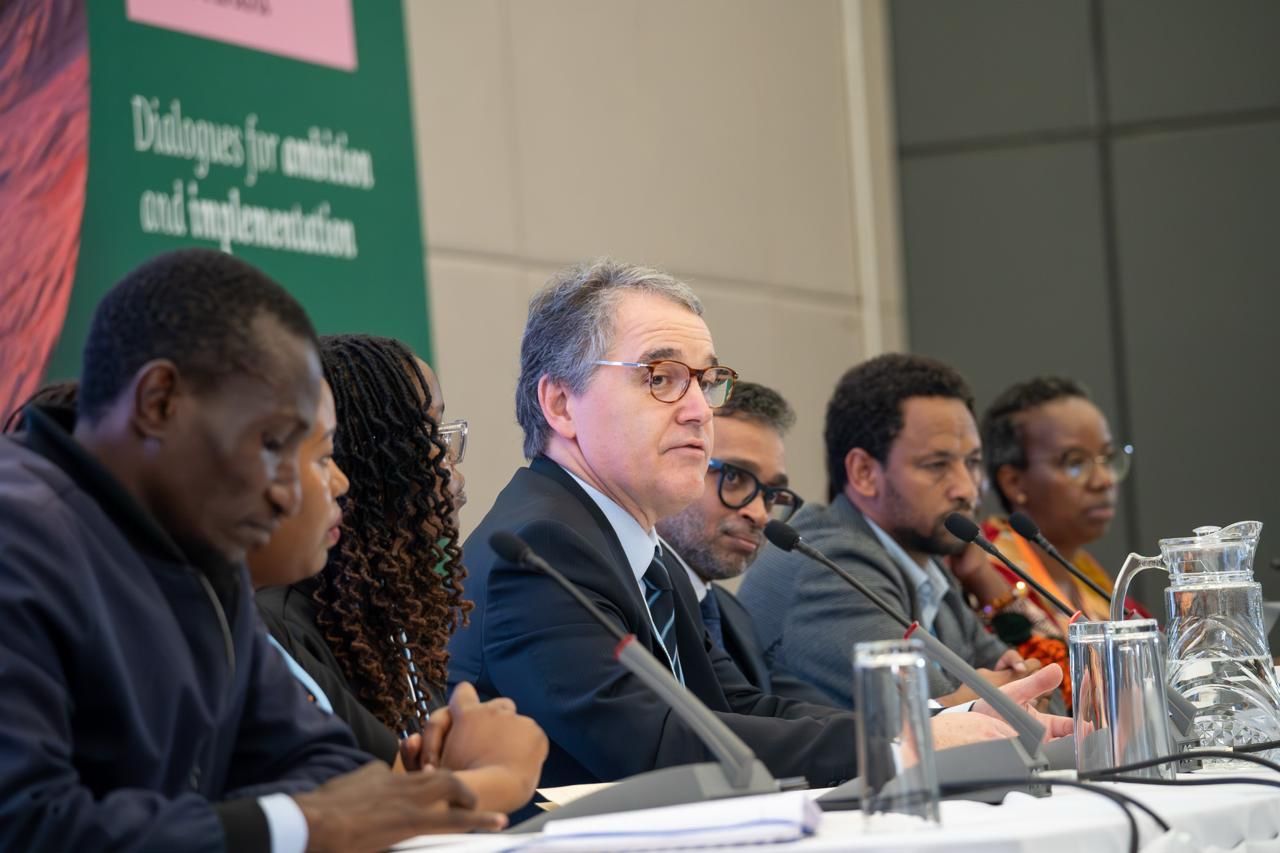
HLCC Dan Ioschpe, speaking on the COP 30 Action Agenda during Africa Climate Week
The clock is ticking for governments to outline how they will address the climate crisis over the next decade. The September deadline for countries to submit their new or updated Nationally Determined Contributions (NDCs) is just days away. These climate plans — the backbone of the Paris Agreement — are supposed to chart how each nation will reduce emissions and adapt to climate impacts through 2035. Yet as of this week, only 34 countries have submitted new or updates plans this round. With more than 80 percent of the world still missing from the table, the question hanging over the upcoming COP30 in Belém is whether ambition will arrive on time — and how it will be turned into action.
Read more
Related articles for further reading
“The implementation agenda is not about new commitments, it’s about making sure NDCs and other frameworks are actually delivered,” said Dan Ioschpe, Brazil’s High-Level Climate Champion for COP30. He emphasized that if the architecture being built around COP30 holds, it could become “a valuable resource for negotiators and governments to develop and implement their NDCs.”
This sense of urgency and opportunity framed the latest Belem Desk media briefing, which brought together Ioschpe alongside Beatriz Granziera, Senior Policy Advisor at The Nature Conservancy, and Lidiane Melo, Director at the Department of Mitigation Policies and Implementation Instruments within Brazil’s Ministry of Environment. Their interventions underscored both the risks of delay and the opportunities for NDCs to act as instruments of transformation.
Granziera reflected on the slow pace of submissions and overall trends: “Most countries haven’t significantly strengthened their 2030 emissions targets. Near-term ambition remains relatively weak, and that’s not great news for the climate.” At the same time, she highlighted encouraging developments: many of the updated NDCs are now economy-wide, encompassing energy, land use, transport, and waste, and more are incorporating adaptation and nature-based solutions.
“NDCs are much more than climate goals. They are instruments of transformation, accelerating the shift toward a greener and more competitive economy.”
Lidiane Melo, director of the Department of Mitigation Policies and Implementation Instruments, Ministry of Environment, Brazil
Brazil’s NDC: Ambition and Just Transition
The COP 30 host country, Brazil, is among the few to have already submitted its new NDC. Announced in November 2024, it commits to reducing net greenhouse gas emissions by 59–67 percent by 2035, compared to 2005 levels, and achieving climate neutrality by 2050. She stressed that NDCs are not just climate targets but “instruments of transformation,” with the potential to create jobs, reduce inequalities, drive technological innovation, strengthen strategic sectors, expand renewable energy and mobility, and boost the bioeconomy.
Lidiane Melo, who is leading a team dedicated to pushing the implementation of Brazil’s climate plans at the Ministry of Environment, explained how this ambition is backed by a detailed national climate plan (Plano Clima, in Portuguese), looking into the next ten years, and designed to “bring coherence to the Brazilian NDC’ and brings together sectoral strategies for energy, agriculture, forests, transport, and cities, anchored in two pillars: mitigation and adaptation.
Central to Brazil’s approach is the role of nature-based solutions, which are explicitly woven into the plan. Melo underlined the importance of restoring forests, protecting mangroves, adopting regenerative agriculture, and investing in natural infrastructure that can make cities and communities more resilient. For her, these are not add-ons but essentials for “a climate action agenda that is robust, responsible, and equal to the scale of the challenge.”
A dynamic and democratic policy device, the plan is to be reviewed every four years, and informed by cross-ministerial coordination and public consultation. Crucially, it also incorporates cross-cutting strategies for governance, finance, and just transition — recognizing that climate policy must be both equitable and implementable. “It’s essential that we all contribute, each in our own context, with our own potential, to make the necessary changes,” Melo emphasized.
We believe implementation will remain central to the COPs for the foreseeable future. And by organizing our efforts around clear objectives and consistent engagement—day by day, year by year—we can increase efficiency and productivity. This architecture itself could become one of COP30’s strongest legacies.”
Dan Ioschpe, COP 30 High-level Climate Champion
Implications for COP30: From Pledges to Delivery
Underlying all three interventions was a central truth: ambition is meaningless without the means to deliver. Questions from journalists during the briefing highlighted concerns about how countries — particularly in the Global South — will finance and deliver their plans.
Granziera pointed to Article 6 of the Paris Agreement as a tool to mobilize resources through international cooperation and carbon markets, provided integrity and transparency are upheld. Melo emphasized Brazil’s new climate investment platform as a way to attract funding for national and local projects.
For Ioschpe, success in Belém will not come from announcing yet more promises but from making the existing landscape of commitments more effective and transparent. The COP30 Climate Action Agenda is designed to bring coherence to the patchwork of climate initiatives already underway. “Our role is to support, connect, and amplify what already exists,” he said, pointing to a new architecture that maps 600 initiatives into 30 objectives, with activation groups working to remove barriers and accelerate delivery.
One of the most significant innovations on the table is the Tropical Forest Forever Fund, envisioned as a mechanism to deliver sustained financing for standing forests. But Ioschpe also pointed to Brazil’s broader potential: “Clean, renewable energy generation is key. That includes sectors like data centers, sustainable aviation fuels, and hydrogen applications for industries such as steel and petrochemicals. Brazil is exceptionally well-positioned in these areas. Of course, forests and food systems are also central. I believe these three — energy, forests, and food — are Brazil’s strongest assets and will likely form the backbone of any long-term socio-economic development strategy for the country.”, he said, stating that business leaders are already showing commitment to this agenda.
“No company wants to be seen as part of the unsustainable side of the equation. Sustainability is now a baseline requirement for staying relevant over the next 10, 20, or 30 years. That’s how most business leaders are thinking about their positioning.”
Dan Ioschpe, COP 30 High-level Climate Champion
A Collective Test
If the first deadline for NDCs earlier this year was a warning shot, the September deadline is crunch time. As the world looks toward Belém, the test will not only be whether more countries submit their plans, but whether those plans — and the finance to back them — can lay the groundwork for action.
“There’s a mismatch between expectations of what a COP can deliver and what it’s designed to do. But Belém can be the place that sets the tone and pushes ambition forward.”
Beatriz Granziera, Senior Climate Policy Advisor at The Nature Conservancy
For a deeper look at how countries are incorporating nature into their climate strategies, see Nature4Climate’s analyses: Nature gains ground in 2035 NDCs — but implementation remains an ‘if’ and New NDCs and nature’s role in 2035 targets, which includes case studies of the UK, Brazil, UAE, Canada, New Zealand and Ecuador.
